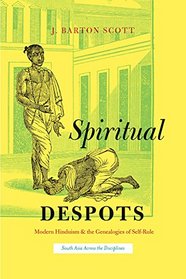Search -
Spiritual Despots: Modern Hinduism and the Genealogies of Self-Rule (South Asia Across the Disciplines)
Spiritual Despots Modern Hinduism and the Genealogies of Self-Rule - South Asia Across the Disciplines
Author:
Historians of religion have examined at length the Protestant Revolution and the widespread effects of ?priestcraft? rhetoric that grew out of it, but J. Barton Scott, in Spiritual Despots, reveals an unexamined piece of that story: how Protestant missionaries spread anticlerical rhetoric throughout India, activity from which the ongoing effects... more »
Author:
Historians of religion have examined at length the Protestant Revolution and the widespread effects of ?priestcraft? rhetoric that grew out of it, but J. Barton Scott, in Spiritual Despots, reveals an unexamined piece of that story: how Protestant missionaries spread anticlerical rhetoric throughout India, activity from which the ongoing effects... more »
ISBN-13: 9780226368672
ISBN-10: 022636867X
Publication Date: 5/30/2016
Pages: 288
Rating: ?
ISBN-10: 022636867X
Publication Date: 5/30/2016
Pages: 288
Rating: ?
0 stars, based on 0 rating
Publisher: University Of Chicago Press
Book Type: Hardcover
Members Wishing: 0
Reviews: Amazon | Write a Review
Book Type: Hardcover
Members Wishing: 0
Reviews: Amazon | Write a Review
Genres:
- History >> Asia >> India
- History >> Europe >> Great Britain
- Categories >> Kindle eBooks >> Religion & Spirituality >> Hinduism
- Religion & Spirituality >> Hinduism >> History




